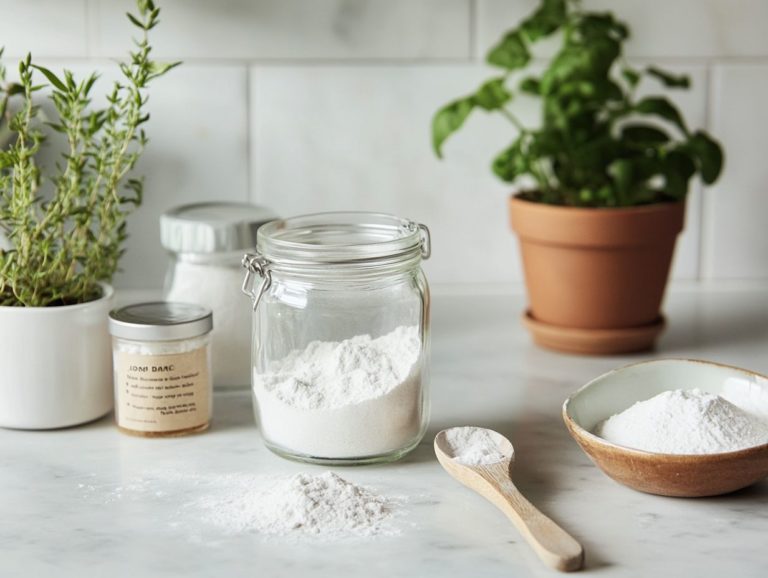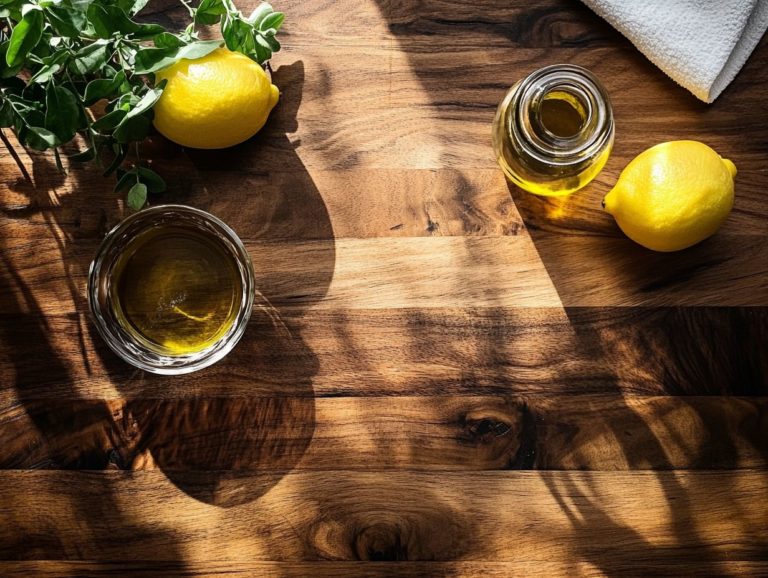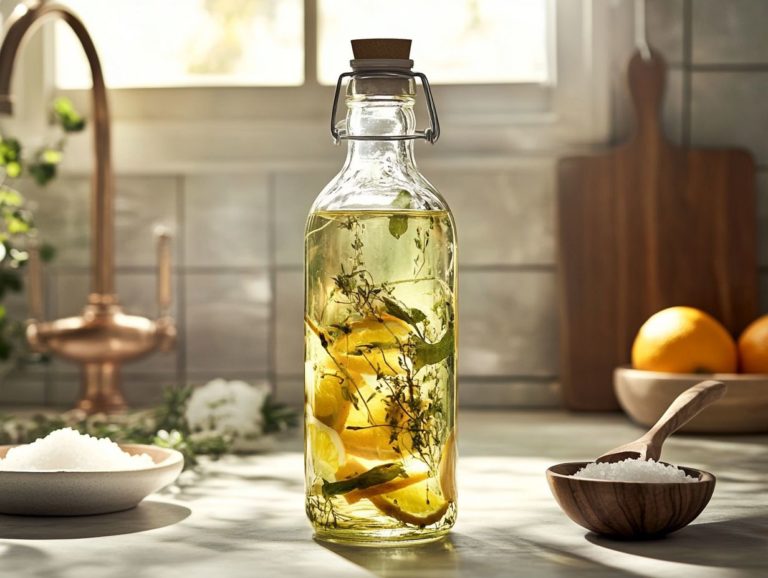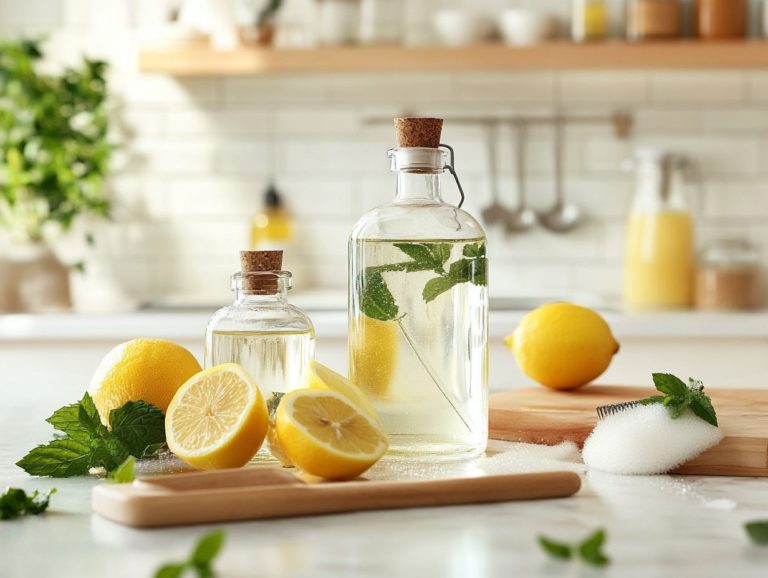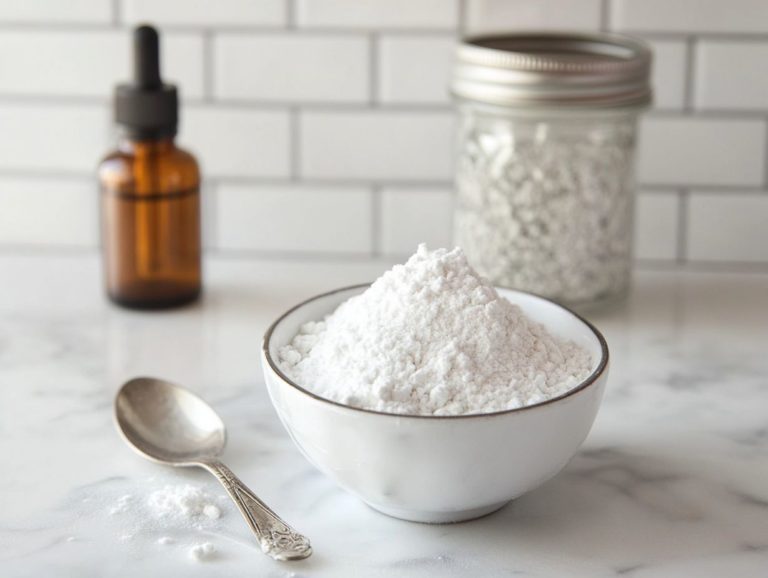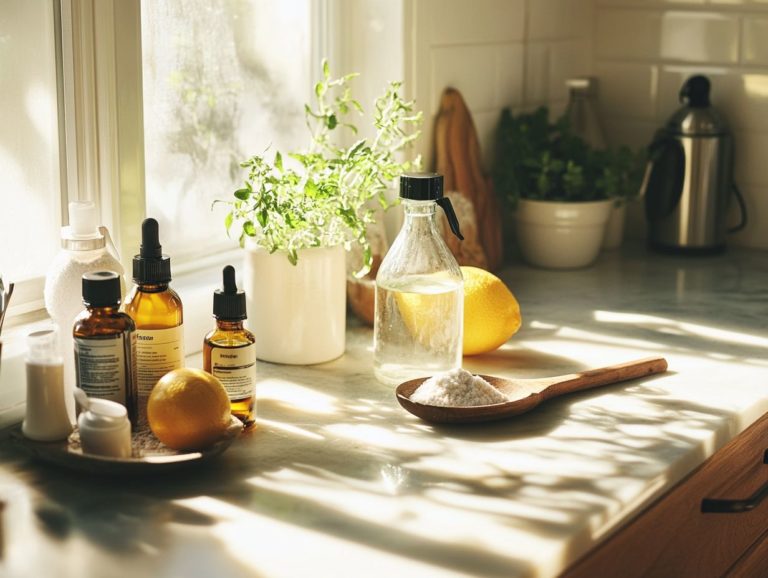Homemade Cleaners: Tips for Safe Use
Switching to homemade cleaners presents a myriad of benefits that can elevate your cleaning routine to new heights, as highlighted by consumer products expert Carolyn Fort from Good Housekeeping.
Not only are they cost-effective and tailored to your preferences, but they also serve as an eco-friendly alternative to commercial products, according to experts at the American Cleaning Institute.
With everyday ingredients like white vinegar, baking soda, and even dish soap, you can craft effective cleaning solutions that meet your needs.
By following simple cleaning recipes and essential safety tips, you can maximize the potential of these homemade cleaners, ensuring safe storage and avoiding harmful mixtures.
Seize the chance to create a cleaner, greener home with these valuable insights!
Contents
- Key Takeaways:
- Why Homemade Cleaners Are the Best Choice!
- Common Ingredients Used in Homemade Cleaners
- How to Make Homemade Cleaners: Expert Tips from Carolyn Fort and Better Homes & Gardens
- Tips for Safe and Effective Use of Homemade Cleaners by a Consumer Products Expert
- Frequently Asked Questions
- What ingredients should I avoid when making homemade cleaners?
- Can I mix different homemade cleaners together?
- Are there any natural alternatives to harsh chemicals in homemade cleaners?
- Is it safe to use homemade cleaners around children and pets?
- Can homemade cleaners be just as effective as store-bought cleaners?
- Are there any surfaces that I should not use homemade cleaners on?
Key Takeaways:
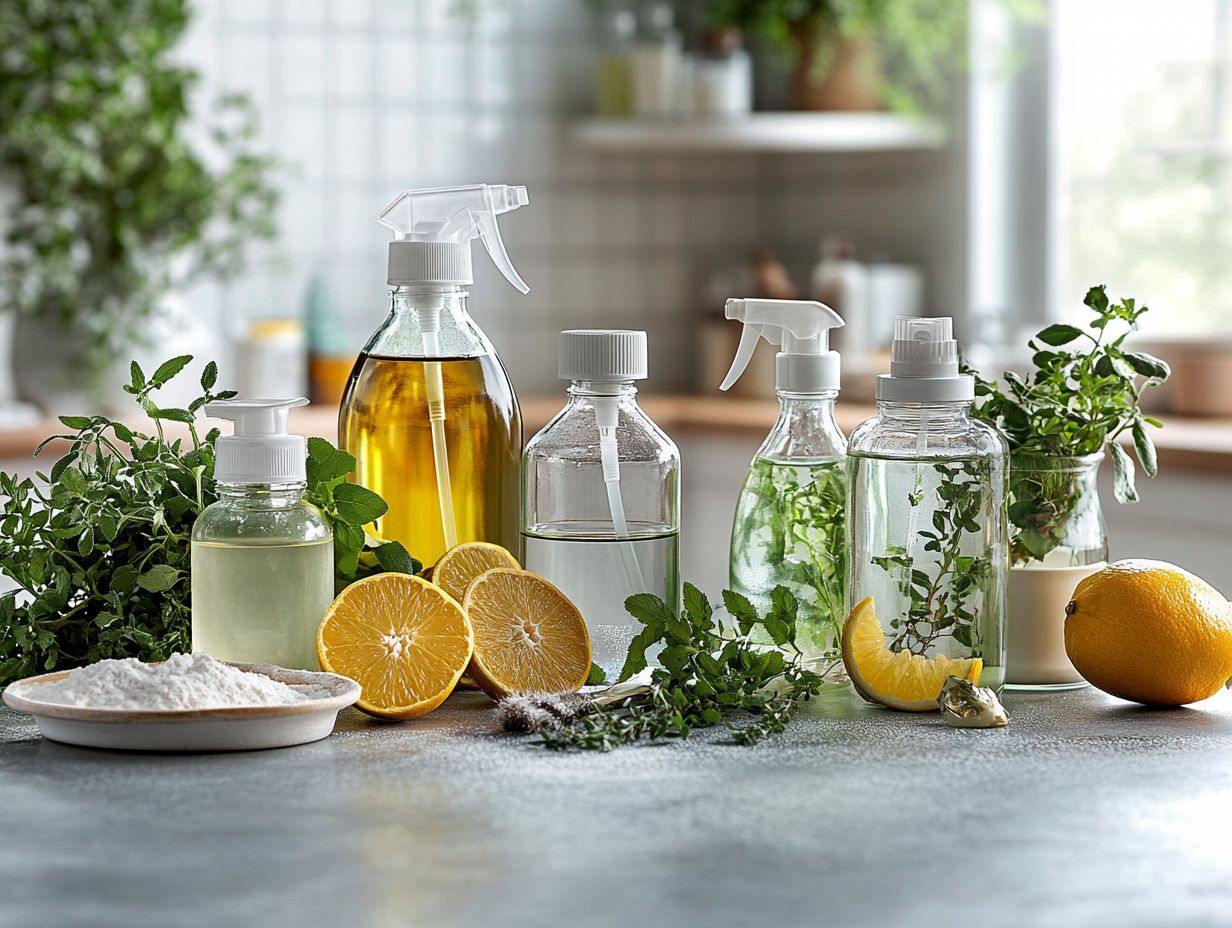
- Save money and reduce chemical exposure by using homemade cleaners, including homemade cleaning sprays.
- Common ingredients such as vinegar, baking soda, lemon juice, and essential oils can effectively clean and disinfect.
- Always practice safety precautions when making and using homemade cleaners, including proper storage, labeling, and avoiding mixing certain ingredients to ensure a toxic-free future.
Why Homemade Cleaners Are the Best Choice!
Embracing homemade cleaners presents an innovative and sustainable approach to maintaining a pristine home. By opting for these homemade solutions, you can save money by utilizing everyday household items like white vinegar, baking soda, dish soap, and even rosemary.
These cleaners are also customizable, allowing you to tailor your all-purpose cleaner or air freshener spray to your personal preferences. With the addition of essential oils like tea tree or lavender, and rubbing alcohol, your homemade cleaning recipes can deliver effective results without relying on toxic chemicals. This guides you toward a toxic-free future and promotes safer storage practices.
1. Cost-effective
Homemade cleaning sprays offer a sophisticated, cost-effective alternative to the often overpriced store-bought cleaners, giving you the power to craft your own effective solutions without breaking the bank.
Consider this: while a typical bottle of all-purpose cleaner might set you back anywhere from $3 to $6, you can whip up a simple homemade solution using everyday ingredients like baking soda and white vinegar for less than $1 per batch. For example, a classic recipe calls for just a cup of white vinegar and a quarter cup of baking soda both of which are affordable staples commonly found in most kitchens. By purchasing these ingredients in bulk, you can significantly cut down your cleaning expenses.
For specially tough stains, adding a bit of Kool-Aid can brighten whites and remove stains effectively!
Harnessing the power of common kitchen ingredients not only fosters a more sustainable lifestyle but also minimizes your exposure to harmful chemicals, creating a safer environment for both your family and pets. Notably, Better Homes & Gardens recommends using ingredients like washing soda for added effectiveness.
2. Environmentally Friendly
Choosing homemade cleaners is an environmentally conscious decision that allows you to reduce your reliance on the toxic chemicals often found in commercial cleaning products.
These conventional cleaners are infamous for releasing harmful pollutants into the air and waterways, contributing to serious environmental concerns like water pollution and habitat degradation. By opting to craft your own cleaning solutions with natural ingredients such as essential oils and vinegar, you can significantly lower your ecological footprint.
Not only do these alternatives minimize chemical runoff, but they also enhance your personal health by limiting your exposure to the harmful substances typically present in conventional cleaners.
Embracing homemade cleaners nurtures a safer ecosystem and encourages a transition toward a sustainable lifestyle, paving the way for a future that’s free from toxins for generations to come.
3. Customizable and Versatile
One of the standout advantages of homemade cleaners lies in their customizable and versatile nature. This allows you to create various cleaning recipes tailored to your unique needs.
A stronger all-purpose cleaner can be the game-changer you need for tough grime! Simply adjust the vinegar-to-water ratio to enhance its strength while keeping it eco-friendly.
When crafting an air freshener spray, infuse it with different essential oils perhaps lavender for a soothing effect or eucalyptus for a refreshing aroma. Transform your cleaning experience into something truly enjoyable!
You can also delve into innovative cleaning techniques, such as using baking soda as a gentle abrasive for scrubbing surfaces or harnessing the natural acidity of lemon juice to conquer stubborn stains. By embracing creativity in your cleaning routine, you not only personalize your home care but also make it a satisfying process. This is a great way to merge home design with functionality.
Common Ingredients Used in Homemade Cleaners
Homemade cleaners often feature a selection of widely available ingredients that are not only effective but also safe for various cleaning tasks. You ll find staples such as white vinegar, baking soda, essential oils, and dish soap playing prominent roles in these formulations.
1. Vinegar
White vinegar stands out as a powerful and versatile ingredient that can elevate your homemade cleaning products. It is renowned for its remarkable ability to cut through grease and eliminate unpleasant odors. Cleaning experts, including those at Good Housekeeping, often recommend it.
Thanks to its acetic acid content (the compound that gives vinegar its sour taste), white vinegar becomes your go-to solution for tackling stubborn grime, especially in kitchens where grease tends to accumulate.
Many households have discovered that mixing vinegar with water creates an effective DIY glass cleaner that leaves surfaces streak-free and sparkling. You can also use it as a natural stone cleaner, but ensure you use it correctly to avoid damage.
However, it s crucial to exercise caution when using vinegar on certain materials, such as natural stone or waxed surfaces, as it can potentially cause damage.
Beyond its cleaning prowess, white vinegar also proves to be a valuable ally in deodorizing laundry. It even serves as an excellent alternative to traditional fabric softeners.
With so many benefits, you ll want to keep a bottle of white vinegar at hand for all your cleaning tasks!
2. Baking Soda
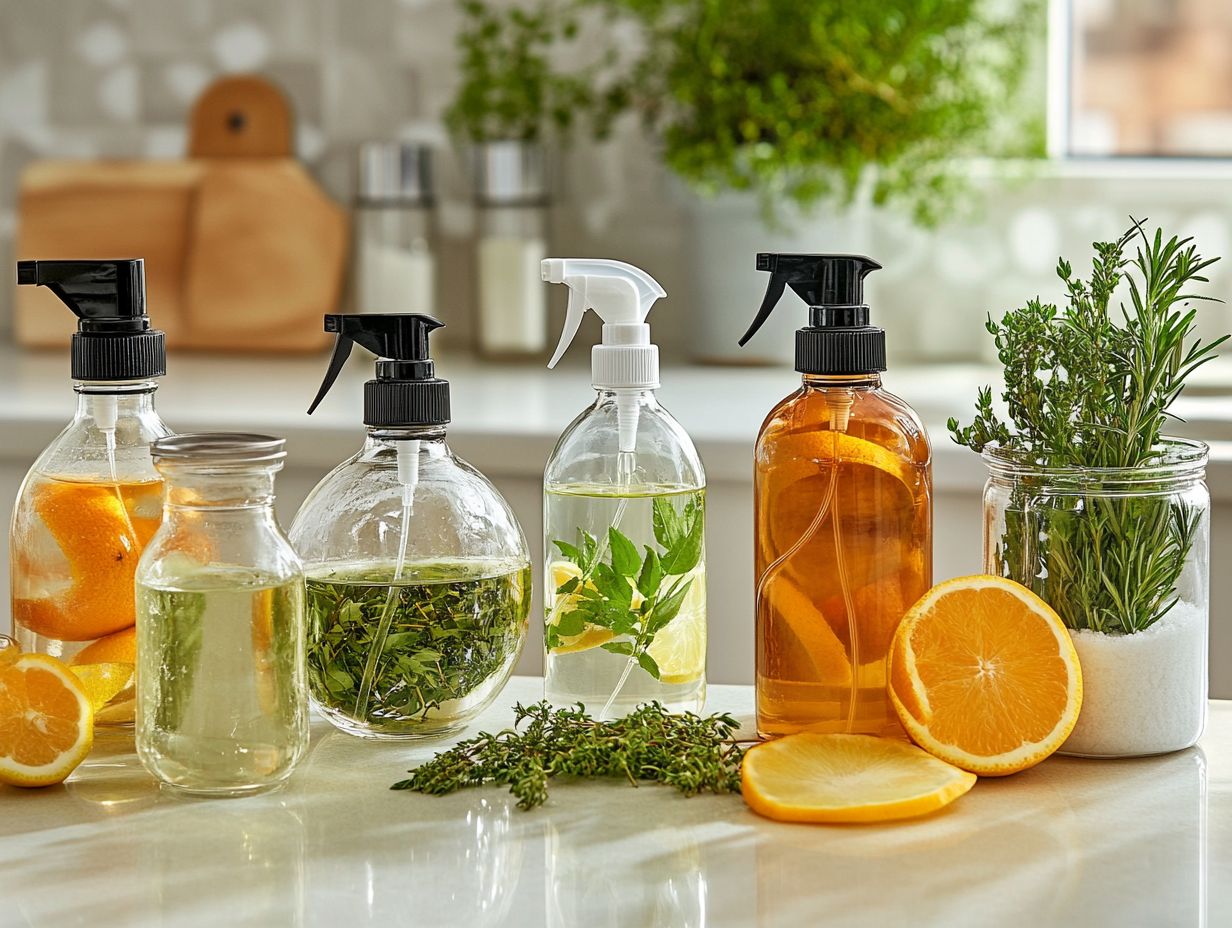
Baking soda is not just a staple in your kitchen for baking; it s also a remarkable natural cleaning agent, celebrated for its impressive stain-fighting abilities. According to Alyssa Gautieri from Better Homes & Gardens, this versatile ingredient is indispensable in any cleaning arsenal.
This adaptable compound can handle a range of household dilemmas, from erasing stubborn carpet stains to serving as a powerful deodorizer in various spaces. You ll find it particularly handy for refreshing your carpets just sprinkle it over the area, let it work its magic for a bit, and then vacuum it up for a revitalized look and scent. ARM & HAMMER endorses baking soda for its versatile cleaning capabilities.
When crafting your own cleaning solutions, the combination of baking soda with vinegar or lemon juice results in a formidable mixture perfect for scrubbing surfaces and neutralizing unpleasant odors.
Beyond its effectiveness, this eco-friendly powerhouse is safe around children and pets, making it an ideal choice for anyone looking for a green alternative in their cleaning regimen.
Start experimenting with these ingredients today to create your personalized cleaning solutions!
3. Lemon Juice
Lemon juice is a remarkable natural ingredient that not only infuses your space with a refreshing scent but also showcases impressive antibacterial properties, making it the go-to option for your DIY cleaning solutions. Incorporating lemon juice into your cleaning supplies can significantly improve your home.
The acidic nature of lemon juice works wonders in breaking down grime and eliminating bacteria, making it perfect for both kitchens and bathrooms. When you incorporate lemon juice into various cleaning recipes, you’ll find it adept at tackling stains while leaving behind a delightful citrus aroma.
The use of lemon juice is frequently recommended by cleaning experts like those at Good Housekeeping. For example, you can easily whip up a DIY glass cleaner by mixing equal parts of lemon juice and water, resulting in a streak-free shine on your windows and mirrors.
If you’re facing tough stains on surfaces, combining lemon juice with baking soda creates a powerful scrubbing paste that rises to the challenge. This technique is great for many surfaces, ensuring a thorough clean.
The versatility of lemon juice allows you to pair it with other natural ingredients, such as vinegar, to craft a potent all-purpose cleaner, providing you with a safe and eco-friendly alternative to commercial products.
4. Essential Oils
Essential oils are more than just a treat for the senses; they bring powerful cleaning properties to your homemade cleaners, elevating your cleaning routine to a whole new level! Essential oils like tea tree and lavender have remarkable benefits, as highlighted by experts at the American Cleaning Institute.
Among these oils, tea tree oil is a standout performer, renowned for its exceptional ability to fight germs that tackle unwanted bacteria and fungi with ease. In contrast, lavender oil not only imparts soothing qualities but also cultivates a serene atmosphere in your space. Oils like rosemary also add fragrance and antibacterial properties to your cleaning supplies.
To make the most of tea tree oil, simply mix a few drops with water in a spray bottle, creating an effective cleaner that kills germs perfect for countertops and bathroom surfaces. For a delightful floor cleaner, combine lavender oil with vinegar and water; this not only ensures a spotless surface but also leaves your home infused with a subtle, refreshing fragrance. You can also use a microfiber cloth to enhance the cleaning process and achieve even better results.
Incorporating these essential oils makes cleaning a more enjoyable experience. Get ready to enjoy a cleaner and fresher home!
How to Make Homemade Cleaners: Expert Tips from Carolyn Fort and Better Homes & Gardens
Crafting your own homemade cleaners is a simple task that gives you the power to customize your cleaning routine. By selecting ingredients that are both safe for your family and kind to the environment, you can elevate your cleaning experience while making a sustainable choice. You can explore various cleaning recipes that use common household items such as baking soda and white vinegar.
1. All-Purpose Cleaner
An all-purpose cleaner is your go-to solution for a variety of surfaces, making it a must-have item in your household cleaning toolkit. As a consumer products expert like Carolyn Fort from Good Housekeeping would advise, it s important to choose the right ingredients to ensure both effectiveness and safety.
This easy-to-make cleaner gives you the power to tackle messes on countertops, floors, and even kitchen appliances with remarkable ease. With just a few simple and natural ingredients, you can create an effective cleaning product that s not only efficient but also kind to the environment. Adding essential oils like rosemary can also enhance the scent and cleaning power of your all-purpose cleaner.
To whip up this all-purpose cleaner, simply combine one cup of distilled white vinegar, one cup of water, a few drops of your favorite essential oil, and a teaspoon of dish soap to give it a delightful scent and extra cleaning power. Pour the mixture into a spray bottle for effortless application.
By opting for natural cleaning products, you not only minimize your exposure to harmful chemicals but also save money over time. For the best results, spray the solution directly onto the surface and let it sit for a few minutes before wiping it away; this gives the cleaner time to work its magic. This method is recommended by Better Homes & Gardens for a toxic-free future.
Don t wait try these recipes today for a cleaner home!
2. DIY Glass Cleaner
A DIY glass cleaner can transform your windows and mirrors into sparkling reflections without the harsh chemicals often found in commercial products. You only need simple ingredients like white vinegar and water. Adding a bit of rubbing alcohol can enhance its cleaning power.
This homemade solution gives you a dazzling, streak-free shine while ensuring a safe cleaning experience for your family and pets. To create this effective cleaner, combine equal parts of white vinegar and water in a spray bottle. Give it a gentle shake to mix everything together nicely.
For the best results, reach for a microfiber cloth; it s exceptional at capturing dust and dirt without leaving scratches behind, a tip endorsed by the American Cleaning Institute. When cleaning, remember to use a circular motion or wipe from top to bottom to prevent drips, ensuring every inch receives the care it deserves.
If your glass is particularly dirty, consider giving it a preliminary wipe with a damp cloth before applying the cleaner for perfect clarity.
3. Toilet Bowl Cleaner
You can easily craft homemade toilet bowl cleaners using baking soda and vinegar. This eco-friendly duo keeps your toilet clean and helps reduce environmental impact.
To create this powerful cleaner, start by pouring a cup of baking soda into the toilet bowl, followed by a cup of vinegar. As these two ingredients mingle, you’ll see bubbles forming as they react with each other. This bubbling action effectively breaks down stains, lime scale, and organic matter, making scrubbing much easier.
Make it a habit to use this cleaning method weekly for a fresher toilet! Regular maintenance fosters a hygienic bathroom environment and extends the lifespan of your plumbing fixtures, ensuring sanitary conditions remain a top priority.
4. Natural Stone Cleaner
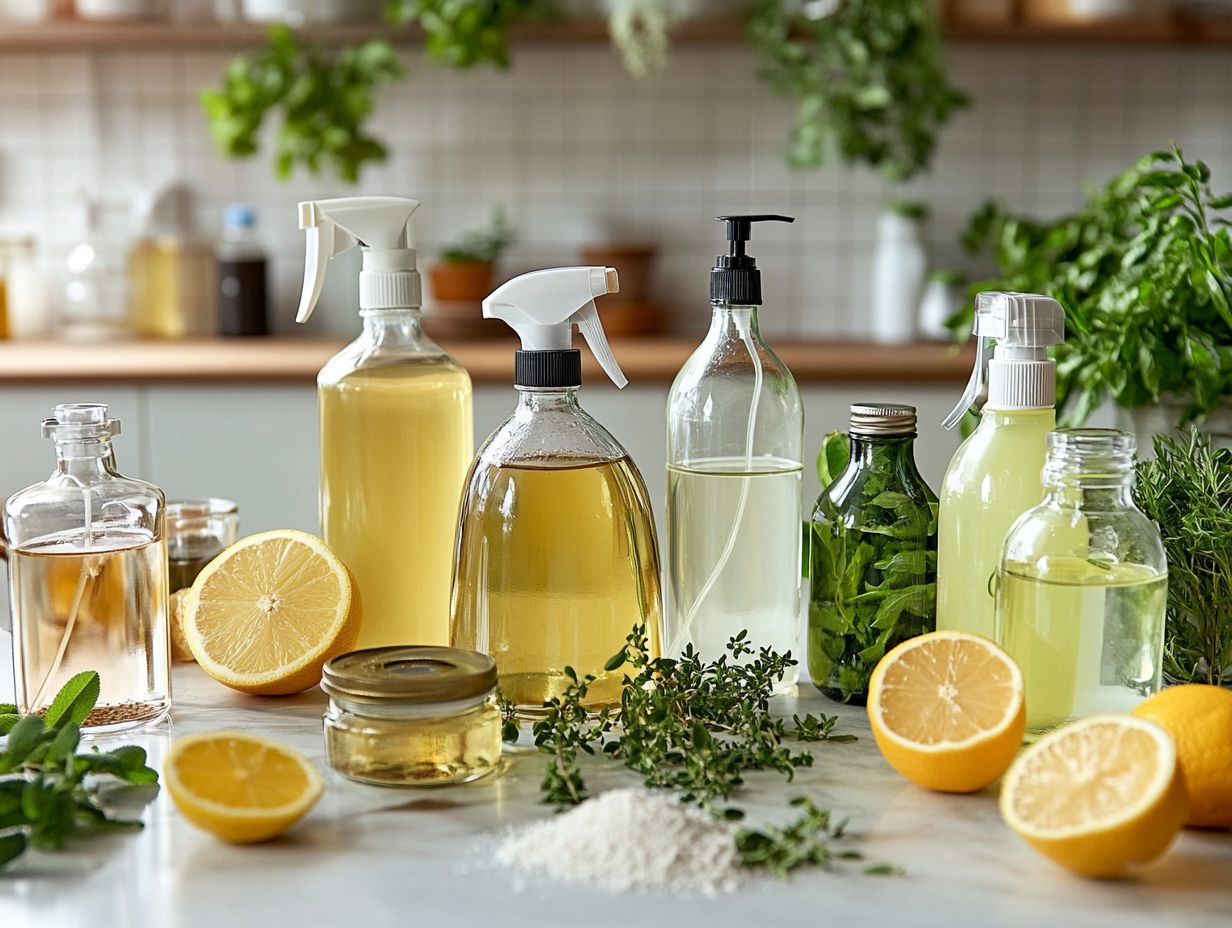
A floor cleaner crafted from natural ingredients effectively tackles a variety of flooring types, including tiles and natural stone, while preserving their integrity. This eco-friendly alternative eliminates dirt and grime while enhancing the beauty of the surface beneath.
For your natural stone cleaner, consider a harmonious blend of vinegar, olive oil, and essential oils such as tea tree or lemon. The vinegar s acidity dissolves grime, while olive oil conditions the surface, preventing it from drying out. The essential oils provide a delightful fragrance and add antibacterial properties, elevating your cleaning routine to a new level of cleanliness.
When applying the cleaner, grab a damp mop and exercise caution to avoid saturating the flooring, especially with porous stones like travertine that can absorb liquids and sustain damage. Always test your mixture on a small, inconspicuous area first to ensure compatibility before proceeding with a full clean.
Tips for Safe and Effective Use of Homemade Cleaners by a Consumer Products Expert
To ensure the safe and effective use of your homemade cleaners, focus on proper storage, clear labeling, and applying best cleaning techniques. For additional tips on storing homemade cleaners safely, check out advice from the experts at Better Homes & Gardens. By doing so, you can maximize their benefits and enjoy a cleaner, healthier environment.
Try these homemade cleaners today and experience the difference in your space!
1. Proper Storage
Properly storing your homemade cleaners is crucial for maintaining their effectiveness and ensuring the safety of your household, particularly if there are children or pets around. Properly labeled containers and safe storage practices are essential.
To achieve this, you should keep these solutions in airtight containers that are clearly labeled. This simple step prevents any accidental contamination or confusion with food items. Storing your cleaners in cool, dark places is also wise; exposure to light and heat can reduce their cleaning properties and shorten their shelf life. The American Cleaning Institute offers guidelines on maintaining the effectiveness of your cleaning supplies through proper storage.
It s essential to keep all cleaning supplies securely out of reach of young children. Improper storage can lead to accidental spills or ingestion, posing serious health risks. By following these best practices, you can create a safer environment while still enjoying the many benefits of your homemade cleaning products. Consider consulting resources like Good Housekeeping for further tips on proper storage practices.
2. Labeling and Identification
Labeling your homemade cleaning supplies is essential for safe and effective use, allowing you to quickly identify the contents and any potential allergens.
By creating clear and informative labels, you empower everyone in your household to use these cleaners responsibly, significantly reducing the risk of accidents, especially in a bustling home environment. For example, including a list of ingredients not only highlights possible irritants but also fosters transparency regarding what is being used.
Consider adopting effective labeling techniques, such as using color-coded stickers or tags to differentiate between various types of cleaners, like:
- All-purpose cleaners
- Glass cleaners
- Disinfectants
Providing concise usage instructions, such as “dilute before use” or “do not mix with bleach,” can further enhance safety and improve the overall cleaning experience.
3. Avoid Mixing Certain Ingredients
Being aware of which ingredients to avoid mixing is crucial for maintaining safety when using homemade cleaners, as certain combinations can lead to harmful reactions.
For example, when you mix vinegar and baking soda, it produces carbon dioxide gas, which can be hazardous in enclosed spaces. Similarly, combining bleach with ammonia generates toxic chloramine vapors. These reactions pose immediate health risks and can also cause damage to your surfaces and appliances.
By sticking to tested cleaning techniques and understanding the consequences of improper ingredient mixing, you can create a safer and cleaner environment.
Selecting the right ingredients and methods is essential for fostering a toxic-free future, ultimately enhancing the safety and effectiveness of your DIY cleaning efforts.
4. Test on Small Areas First
Before you apply a homemade cleaner to a large surface, it s wise to conduct a test on a small, inconspicuous area to confirm its compatibility and effectiveness. This step is essential in avoiding damage to delicate surfaces, as recommended by consumer products experts.
This precaution is particularly important when working with sensitive materials like natural stone or upholstery, where harsh chemicals could lead to irreversible damage. Begin by applying a small amount of the cleaner to a hidden spot, such as the corner of a stone countertop or a discreet section of fabric. Let it sit for a few minutes, and then gently blot or wipe it with a clean cloth to gauge any immediate reactions.
Once the test area has dried, take a moment to carefully observe for any changes in color, texture, or finish. If you notice no adverse reactions, it s generally safe to go ahead with the full application. This methodical approach not only protects your valuable surfaces but also ensures that your homemade cleaner effectively meets your cleaning needs.
5. Use Safety Gear
When you re crafting homemade cleaning supplies, it s essential to don safety gear like gloves and masks to ensure your safety throughout the cleaning process. This simple step not only safeguards your skin and respiratory system but also significantly reduces the risk of allergic reactions and irritation from those strong cleaning ingredients. Experts like Carolyn Fort from Good Housekeeping strongly advocate for the use of safety gear when handling any cleaning products.
Consider adding eye protection to your arsenal, especially when you re mixing substances like vinegar and baking soda or working with essential oils that can be a bit harsh on the eyes. Check your gear regularly and replace any worn-out items to keep their protective qualities intact.
After your cleaning session, don t forget to keep your gear in top shape! It s key to a safe and effective cleaning session. This means thoroughly washing and drying reusable gear or responsibly disposing of single-use items. Taking these steps not only ensures safety for your next cleaning adventure but also shows you care about safety.
Frequently Asked Questions
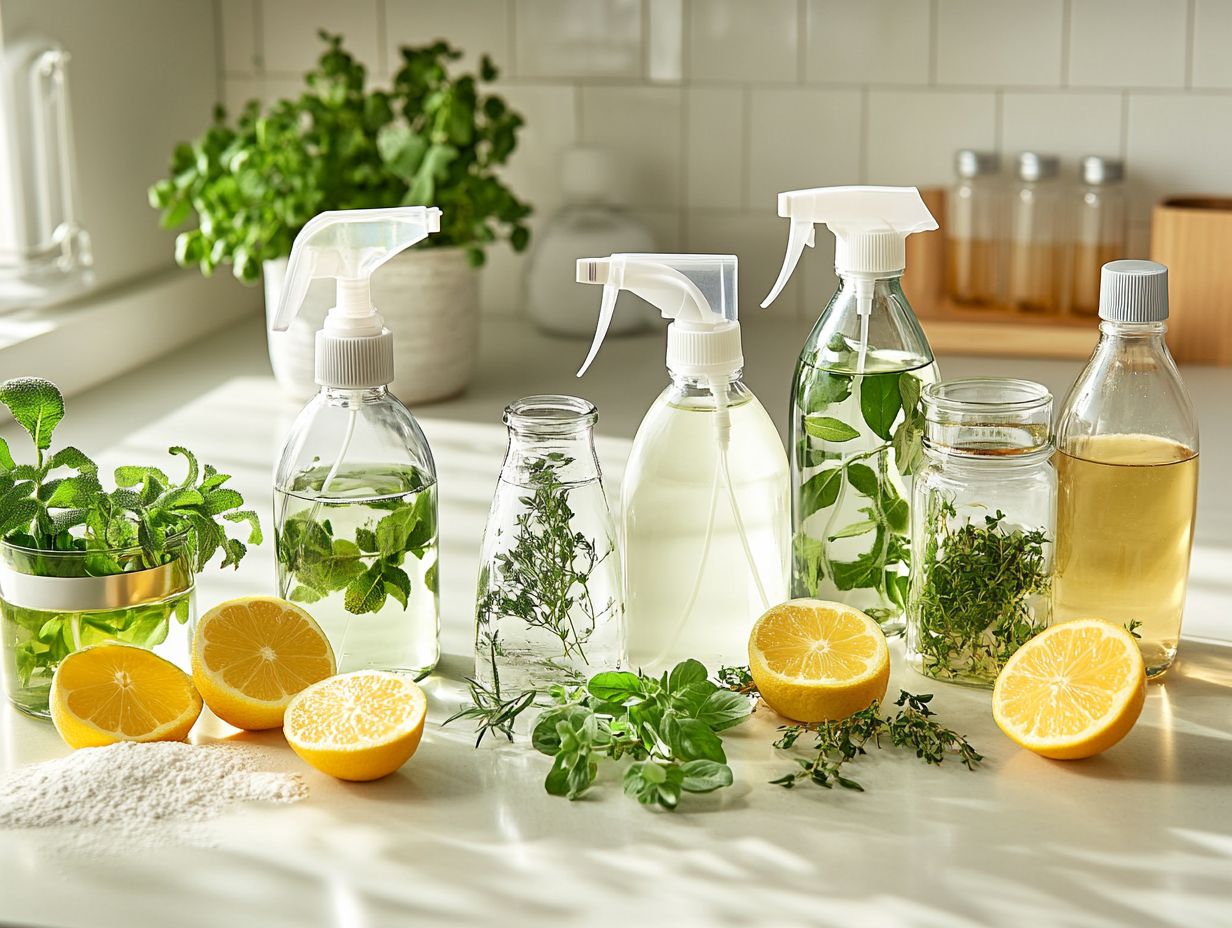
What ingredients should I avoid when making homemade cleaners?
Avoid using ammonia, bleach, and other harsh chemicals when making homemade cleaners. These ingredients can be harmful to your health and can also damage surfaces.
Can I mix different homemade cleaners together?
No, mixing homemade cleaners can be dangerous and create toxic fumes. Stick to using one type of cleaner at a time.
Are there any natural alternatives to harsh chemicals in homemade cleaners?
Yes, there are many natural alternatives such as vinegar, baking soda, and essential oils that can be used in homemade cleaners. These ingredients are safer for your health and the environment.
Is it safe to use homemade cleaners around children and pets?
While homemade cleaners are generally safer than store-bought cleaners, it is still important to use caution when using them around children and pets. Keep these cleaners stored out of reach and use them in well-ventilated areas.
Can homemade cleaners be just as effective as store-bought cleaners?
Yes, with the right ingredients and recipes, homemade cleaners can be just as effective as store-bought cleaners. Plus, they are often more cost-effective and better for the environment.
Are there any surfaces that I should not use homemade cleaners on?
Avoid using homemade cleaners on certain surfaces such as marble, natural stone, and brass. These surfaces can be damaged by acidic ingredients like vinegar and lemon juice.

